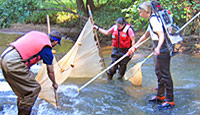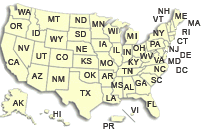Delaware River Basin NAWQA Study

DELAWARE RIVER BASIN NAWQA
ABOUT USUSGS IN YOUR STATEUSGS Water Science Centers are located in each state. 
|
Delaware River Basin (DELR) NAWQA Study UnitJeff Fischer, Project Chief, USGS 
The Delaware River Basin (DELR) NAWQA study began in 1997 and is a multi-district effort. Coordinated from our West Trenton, New Jersey office, the study also includes paticipation by our Harrisburg, Pennsylvania and Troy, New York offices. During the first two years of the study (1997-1998) staff was hired, a liaison committee was started, existing data was analyzed, and plans for three years (1999-2001) of intensive data collection were developed. The intensive efforts will include multi-scale study approaches to collect samples of water, suspended and bed sediment, biologic tissues, and aquatic communities. The DELR NAWQA study is then scheduled to enter a low-intensity phase of monitoring and report writing in 2002 and return to another 3 years of intensive study again in 2008-2010.
MAJOR WATER-QUALITY ISSUES IN THE DELAWARE RIVER BASINAdvances in the treatment of municipal and industrial waste and changes in manufacturing and processing techniques over the past 25 years have led to improved water quality in many parts of the Delaware River Basin. One indication of this improvement is the return of shad runs to the Delaware River. The presence of toxic compounds, however, still leads to consumption advisories for many fish species, and nutrient loadings adversely affect water quality and the health of ecological communities. Many of the water-quality issues in the Delaware River Basin can be related to the high human population density in the area and related activities associated with urban, industrial, and agricultural land use. Most concerns are related to human health (the quality of domestic water supply, the safety of water contact recreation, and the safety of eating game fish) and the health of ecological communities. Some of the major water-quality issues that are currently being addressed by water-resource managers in the Delaware River Basin include– 
The Delaware River Basin NAWQA study will characterize spatial and temporal variations in water quality and relate those changes to natural processes and human factors. This scientific characterization can be used by waterresource managers, State and local governments, citizens' groups, and planners as a basis for implementing water-quality management actions and evaluating long-term changes in water quality. WHAT IS THE NATIONAL WATER-QUALITY ASSESSMENT PROGRAM?During the past 25 years, industry and government have made large financial investments in manufacturing, processing, and wastewater-treatment facilities to reduce the amount of contaminants being discharged. Although these investments have led to improved water quality across the Nation, concerns about the effects of nutrients, toxins, and pathogens on human health and that of ecological communities remain. To address the need for consistent and scientifically sound information for managing the Nation's water resources, the U.S. Geological Survey began the National Water-Quality Assessment (NAWQA) program in 1991. This program is unique in that it integrates surface- and groundwater-quality monitoring with the study of aquatic ecosystems. The goals of the NAWQA program are to (1) describe current water-quality conditions for a large part of the Nation's freshwater streams and aquifers (water-bearing sediments and rocks), (2) describe how water quality is changing over time, and (3) increase our understanding of the natural and human factors that affect water quality (Leahy and others, 1990, Gilliom and others, 1995). |